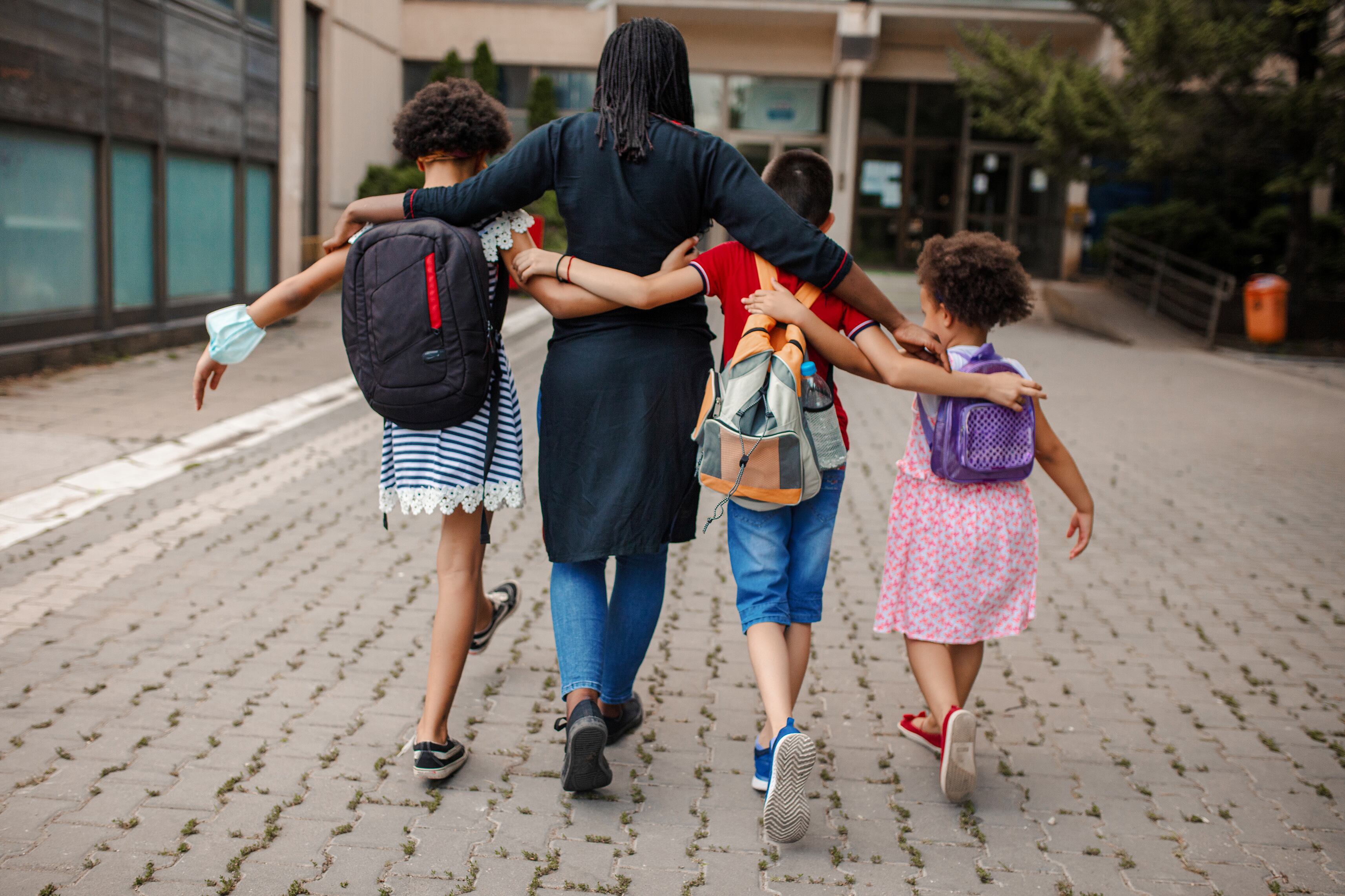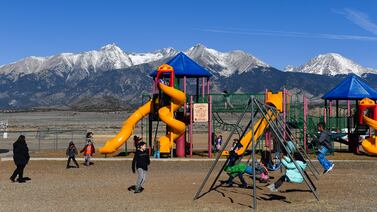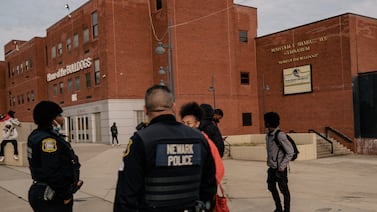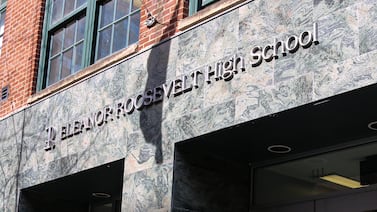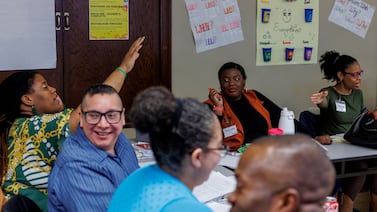Thirkell Elementary teacher Emma Howland-Bolton spent weeks “gently badgering” parents to chaperone a March 2022 field trip to the Belle Isle Aquarium after COVID-19 lockdowns. She managed to get five parents to volunteer.
“I was just so hyped that we were finally getting to go somewhere,” Howland-Bolton said. “I had kids who had basically been alone for two years … so anything that seemed fun, we were super hyped about.”
But on the day of the field trip, the school’s principal sent all the parents home, leaving just Howland-Bolton and a school secretary to chaperone. It turns out that Howland-Bolton had unknowingly broken the Detroit Public Schools Community District volunteering policy, which requires school volunteers to be cleared through a portal, pass a background check and, in some cases, get fingerprinted.
Other school districts have similar policies to the one at DPSCD, which established its most recent policy in 2019 to help ensure student and staff safety.
But some Detroit parents are concerned about who has access to that data, saying the policy invades their privacy and discourages them from being involved in their children’s academic lives.
DPSCD’s visitor policy varies depending on the scope of the volunteer work
In short, there are levels to this policy and how much information a visitor has to give DPSCD.
The school district’s policy states the superintendent can bar school access to anyone if their presence would be “detrimental to the good order of the school.” The policy specifies that the access of non-staff — which can include parents and community members — to classes is at the principal’s discretion. DPSCD’s background clearance guidance further outlines what level of security clearance visitors and volunteers need, but it doesn’t specify how to get that clearance.
For a governing policy, it’s difficult to find online. You can search for it on a district website, but you have to know what you’re looking for to find it. Go to the DPSCD Board of Education page and open the “BoardDocs & Meeting Agenda” link. On the page that opens, select “Policies” in the top menu. Choose “3000 Professional Staff” in the left menu, and the volunteer policy is titled “Volunteers.”
There’s an important distinction between visitors and volunteers. Parents and community members can visit the school during school hours if they are escorted to and from their location by a staff member. Parents are also allowed inside schools for events like parent-teacher conferences or career days without going through the volunteering portal, said Sharlonda Buckman, assistant superintendent of family and community engagement.
But anyone who volunteers at a school must complete a background check. There are levels to this, too.
Buckman said volunteers who will be supervised by school staff must provide their contact information and an ID, which the district runs through the Internet Criminal History Access Tool and the Michigan State Police Sex Offender Registry. Buckman said it takes about seven business days to get approved for this level, with no cost to volunteers. Most field trip chaperones fall into this category.
If the volunteer will work one-on-one with students without staff supervision, more information is needed — including a more thorough criminal-conviction background check and checking fingerprints through a federal database called the Criminal Justice Information Services, Buckman said. It takes 10 business days to get approved at this level, and Buckman said the district is currently covering the $65 fee for volunteers. Tutors and coaches fall into this category, according to DPSCD.
“We have a committee … to look at individual issues,” Buckman said. “If (a conviction) is old and (the offense) hasn’t harmed children, a lot of times, we can go ahead and give them the green light.” She said those with offenses like crimes against the district or criminal sexual misconduct are barred from access.
The background checks occur through the district’s Human Resources Department. Buckman said the school district uses the same system as the Michigan State Police for background checks.
“We’re only vetting you to find out whether or not we’re going to have you working around children,” Buckman said. “We don’t turn over information. We’re getting the information from their systems.”
Buckman said the district cares about supporting the children in their education, and that includes abiding by policies designed to keep students safe, especially with rising school-related violence.
“We don’t ban parents,” Buckman said. “That’s not what we do. We’re in the spirit of bringing people in, not pushing them out. … We recognize that sometimes there are issues, so we restrict the visits” of those parents.
Some parents say they feel left out
DPSCD officials have met with parents who expressed concerns about the policy. Some have said they feel left out of their children’s academic lives, and they’re noticing it more after the COVID-19 pandemic.
Sharell Williams has four children who attended Thirkell Elementary. She said she used to volunteer freely and bring cupcakes to her children’s school. But when pandemic-related lockdowns ended, something shifted. Her relationship with her children’s teachers and the school staff as a whole became distant.
“I understand a lot of stuff has changed,” Williams said. But the schools “used to make you feel welcomed. … It’s not a welcoming feeling.”
Shannon McEvilly is a parent of a sixth grader at Foreign Language Immersion and Cultural Studies School a board member of the National Lawyers Guild. She said she used to volunteer at her child’s school, but the lack of information about fingerprints and background checks deterred her.
“It’s never been explained what they’re doing with those fingerprints,” McEvilly said.
Other school districts, including ones in Dearborn and Hamtramck, have similar volunteer policies.
Some DPSCD parents haven’t let the policy deter them from being involved in their child’s schooling. Jaquitta Nelson frequently volunteers at Paul Robeson Malcolm X Academy, assisting teachers in classrooms and monitoring students during cafeteria duty. However, she wishes the process was easier so more parents could volunteer.
Nelson said it took about four months for the principal to approve her volunteer application. She was told the delay was because the principal had been busy.
“Who knows how many people have been deterred from that? It was such a hassle,” she said.
Balancing safety with parental involvement
Parental involvement is important for students’ development inside and outside the classroom. Students with parents involved in their studies are more likely to earn higher grades and graduate from high school. These students also tend to develop higher self-confidence and have better social skills.
Wayne State University assistant professor Kess Ballentine, who researches how parental involvement affects students’ academic lives, said school districts must implement less rigid policies if they want higher parental involvement in schools.
She pointed out that Black families are disproportionately detained by police in metro Detroit, which has led to less confidence overall that police will treat them fairly.
Ballentine said this distrust is why many Black and brown parents want to be involved in their kids’ schools — because just as adults are discriminated against by police, their children may be overpoliced by authority figures in school.
“Given the context of Detroit, we have the opportunity, but also the responsibility, to think creatively about how to get parents who are … more likely to be affected by the criminal justice system” in schools, Ballentine said. “We need to think about what we are losing, and what we are gaining by these kinds of blanket policies.”
Ethan Bakuli and Chalkbeat Detroit’s Lori Higgins contributed to this article.
SaMya Overall is a reporter for Outlier Media. You can reach her at samya@outliermedia.org.


